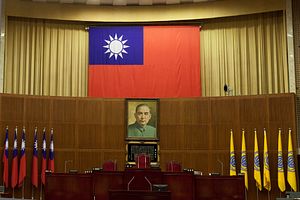China’s Taiwan Affairs office said that Taiwan and Hong Kong independence advocates will “end up with their heads broken and bleeding” as the People’s Liberation Army held military exercises, including aircraft carrier drills off the coast of Taiwan this week.
“A small group of pro-independence forces in Taiwan are colluding with Hong Kong independence advocates to divide the nation,” said An Fengshan, spokesman of the Taiwan Affairs Office. “Their attempts will not succeed. They will end up with their heads broken and bleeding.”
The statement was made in response to the invitation of Hong Kong pro-democracy legislators to a forum on the topic of self-determination hosted by Taiwan’s New Power Party. Lawmakers including Nathan Law Kwun-chung, Edward Yiu Chung-yim, and Eddie Chu Hoi-dick, as well as Joshua Wong Chi-fung, were invited to Taiwan on January 7 and 8 for the event.
It is not the first time China’s Taiwan Affairs Office has made such strong remarks about Taiwanese political events. In October, they responded in a similar manner when Baggio Leung Chung-hang and Yau Wai-ching, the recently ousted democratically elected legislators, visited Taiwan and voiced their opposition to China’s increasingly bold interference in Hong Kong affairs.
New Power Party chair and lawmaker Huang Kuo-chang looked to taunt China further in a personal Facebook post, saying, “Of course, any link to democratic forces is a thorn in the eyes of the Chinese Communist Party.”
The invitation comes after Eddie Chu Hoi-dick said Hong Kong is only just entering into a period of democratization. “Before the Umbrella Movement, the legislature was running on party politics without much attention paid to how the democratic movement was formed,” Chu said, referencing the 2014 protests that engulfed Hong Kong’s busiest streets.
Chu said that the prior activities including the Umbrella Movement had failed, and that they did not instill fundamental democratic principles in the minds of the Hong Kong people.
“Our democratic movement in the past was not a democratic movement. It was only a movement fighting for our voting rights through universal suffrage for the chief executive and the Legislative Council. We never entered a state of a democratic movement,” Chu added.
The “localist” legislator, who won the most amount of votes in the most recent legislative council elections with 84,121 votes, went as far as to criticize the legitimacy of the Basic Law, Hong Kong’s mini constitution, which saw a new round of interpretations recently, resulting in the expulsion of the legislators, Leung and Yau, who have also been labeled as “localist.”
Beijing’s hardline stance is not unexpected as the independence voices of Taiwan have become increasingly vocal with the election of the new president, Tsai Ing-wen, a staunch opponent to the long-held “one China” policy. Tsai rattled China when she made a call to U.S. President-elect Donald Trump. If Trump’s comments are any indication of his future policies, then China will be facing off against a much more unfriendly U.S. Navy in the South China Sea in addition to renewed U.S.-Taiwan relations.

































